What Is Fleet Management in Logistics-Guides And Benefits
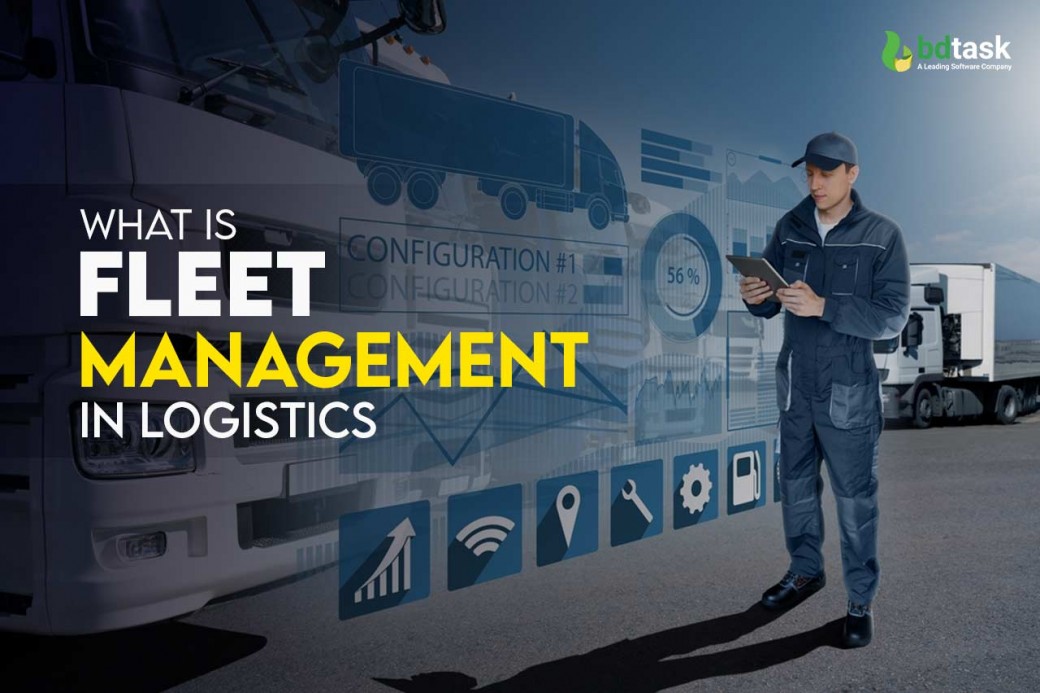
What is fleet management in logistics is a simple question, but fleet management in logistics is quite challenging. Fleet management plays a crucial role in the logistics industry. Encompassing various activities to enhance efficiency, reduce costs, and smooth the movement of goods and services.
The Organisation will see better efficiency and productivity if managed properly.1ss
On the other side
Poor logistics in the company will seriously impact your bottom line, and even if your company is successful, there is still space for improvement.
By implementing effective fleet management strategies, companies can achieve better resource utilisation, improve safety standards, optimise fuel consumption, and deliver products on time. Having both(Fleet Management and Logistics)operations on one platform saves you valuable money and time.
Embracing technological advancements and staying abreast of industry best practices are key to maintaining a competitive edge in the dynamic world of logistics.
What Is Fleet Management?

Fleet management refers to overseeing and organising a company's vehicles, including cars, trucks, vans, ships, and aircraft. It involves various tasks such as vehicle acquisition, maintenance and repairs, fuel management, driver management, and regulation compliance.
The goal of fleet management is
to
maximise efficiency, minimise costs, and improve overall productivity.
What Is Fleet Management In Logistics-The World of Logistics
The logistics sector is increasing, making it a desirable target for those looking to leverage their skills and enter the industry from a new angle.
Fleet management in logistics refers to the strategic administration and operation of a company's fleet of vehicles involved in transportation and delivery activities.
It encompasses various tasks, including
- Vehicle Acquisition
- Maintenance
- Fuel management
- Driver Scheduling
- Route optimisation
- Compliance with regulations
- Overall fleet performance monitoring.
- Vehicle leasing
- Financing
- Licensing
- Maintenance
- Remarketing
- Issue management
- and supply chain
It helps you save money and time by avoiding unnecessary vehicle repairs and maintenance.
With the increasing requirement for fleet management and logistics, there is a necessity to have a suitable platform. These two types of operations are very different and require additional software solutions.
Why Is Fleet Management Important in The Logistics Industry?
It turns into a Nightmare in the case of manual fleet management.
The logistics business depends laboriously on fleet management.After knopwing What is Fleet Management in Logistics lets know the importance of it .The importance of fleet management in logistics in many .
It's only possible for a successful company with proper fleet management. A proper business includes some proper plan. It involves various tasks, including vehicle tracking, maintenance, driver safety, and health. One of the major elements of logistics is transport. So that's why fleet management is the backbone of the logistics industry.
Key Components in Fleet Management in Logistics
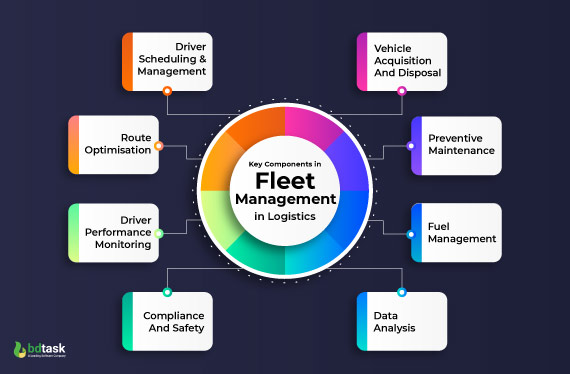
Lets find out the key components of What is Fleet Management in Logistics.
1. Vehicle Acquisition And Disposal
The first component of fleet management is the strategic acquisition and disposal of vehicles. It involves determining the appropriate number and types of vehicles needed for efficient logistics operations, considering load capacity, fuel efficiency, and regulatory compliance. When a vehicle reaches the end of its useful life, proper disposal methods must be implemented to comply with environmental regulations.
2. Preventive Maintenance
Maintaining a fleet of vehicles in optimal condition is crucial for minimising breakdowns, ensuring driver safety, and maximising asset lifespan. Fleet managers must implement a proactive maintenance schedule that includes regular inspections, servicing, and repairs.
________________________________________________
Note that
A fleet manager controls all aspects of a company's fleet. A fleet manager's role could be complicated, from hiring the drivers to resource management to maintaining the fleet's efficiency.
For every task in between, one person calls the shots and runs the show. It's the Fleet Manager.
________________________________________________
The Fleet manager helps identify and address potential issues before they escalate, reducing costly repairs and unexpected vehicle downtime.
3. Fuel Management
Fuel costs constitute a significant portion of a logistics company's expenses. Effective fuel management involves monitoring fuel consumption, implementing fuel-efficient practices, and leveraging technology solutions to track fuel usage. Fleet managers can reduce costs and minimise environmental impact by optimising fuel consumption.
4. Data Analysis
Data analysis is one of the most important aspects of fleet management. A reliable fleet management software offers detailed information regarding your fleet vehicles' so you can know where improvements must be made.
5. Driver Scheduling And Management
Efficiently scheduling drivers and managing their activities is vital for fleet management in logistics. Fleet managers must consider factors such as driver availability, hours of service regulations, and route optimisation. Companies can enhance productivity, reduce overtime expenses, and ensure timely deliveries by coordinating driver schedules.
6. Route Optimisation
Optimising routes is a important aspect of fleet management. Advanced routing software can help determine the most efficient vehicle paths, considering traffic conditions, distance, delivery schedules, and customer preferences.
Being a businessman owner is stressful and makes your life easier by incorporating a management solution. You can schedule dozens of routes in minutes and adjust routes to add last-minute stops without major disruptions to your driver's schedule. Route optimisation allows you to simultaneously import all your stops to the same system to plan dozens of daily stops in minutes.
You can easily get live updates from your drivers to see where they are during their journey. It is a great way to ensure visibility between you and your team members.
By optimising routes through GPS tracker logistics companies can minimise fuel consumption, reduce delivery time, and enhance overall efficiency.
7. Driver Performance Monitoring
Driver performance monitoring involves tracking and analysing driver behaviour, including speed, harsh braking, idling, and adherence to traffic rules. Fleet managers can give feedback and training to drivers to improve their driving habits, reduce fuel consumption, and enhance safety.GPS tracking device will be a great choice for driver monitoring and driver performance checker.
8. Compliance And Safety
Compliance with regulations and safety standards is crucial in fleet management. Fleet managers must ensure that vehicles are correctly licensed, insured, and meet safety requirements. They also need to monitor driver compliance with hours of service regulations and implement safety training programs to reduce the risk of accidents.
Challenges In Fleet Management-In Depth analysis
Rising Fuel Costs
Fluctuating fuel prices pose a significant challenge for fleet managers. Implementing fuel management strategies, adopting alternative fuels, and optimising routes can mitigate the impact of rising fuel costs.
Cost management will still be the biggest challenge in fleet management. Cost management will seriously impact your ability to compete in the present and future markets.
Vehicle Breakdowns And Downtime
Unplanned vehicle breakdowns can disrupt operations and increase expenses. Regular maintenance, timely repairs, and implementing predictive maintenance practices help minimise downtime and ensure smooth operations.
Driver Shortages And Retention
The need for more qualified drivers is a common challenge in fleet management. Offering competitive salaries, providing training opportunities, and fostering a positive work environment are key strategies to attract and retain skilled drivers.
Data Overload -Lack of Data
More data is needed, but undeveloped, excessive data can become another problem for fleet managers in logistics.
Not only is the exact software solution, but it adds no value to your logistics operations.
Fleet managers must build this data to make strategic decisions, as a shortage of real-time information can slow the entire process and stop them from being competitive in a global economy.
Government Regulations And Compliance
Changing government regulations regarding emissions, safety standards, and driver qualifications pose compliance challenges. Fleet managers must stay informed about these regulations and implement necessary measures to ensure adherence.
Maintenance Problems
Maintenance issues would be a big issue for any fleet manager. Keeping track of maintenance like fueling, body works, tire changes and other tasks can get out of hand, especially in a manual, error-prone system.
Unexpected maintenance seriously interferes with your fleet's normal operations, leading to high costs.
Technological Advancements And Integration
Keeping up with technological advancements can be challenging. Integrating telematics systems, advanced analytics tools, and new fleet management software requires careful planning and training to maximise their benefits.
These above problems can impact your fleet efficiency leading to better budget margins and happier clients. In this competitive market, losing your competitive edge equals losing your client.
Top Benefits Of Fleet Management For The Logistics Industry
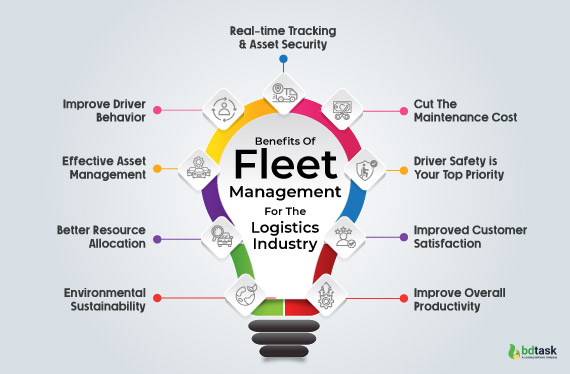
Fleet management software benefits help the global market to grow at a high pace. According to recent research, the market is expected to rise to $67.4 billion in 2029.now its time to find out the benefits of What Is Fleet Management in Logistics.
#Cut The Maintenance Cost#
Proactive maintenance is essential to ensure the longevity and reliability of vehicles in the logistics industry.
Fleet management solutions provide maintenance tracking and reminders, helping companies schedule regular maintenance tasks and avoid unexpected breakdowns. By adhering to a proactive maintenance schedule, logistics companies can minimise vehicle downtime, reduce repair costs, and ensure a smooth flow of operations.
#Driver Safety is Your Top Priority#
Keeping your drivers happy and safe should be one of the most important factors in running your business.
Safety is paramount in the logistics industry, and fleet management systems are crucial in promoting driver safety. These solutions can monitor driver behaviour, such as harsh braking, acceleration, and speeding, providing valuable insights to improve driver performance. Logistics companies can enhance driver safety, reduce accidents, and protect their workforce by implementing safety measures and providing driver feedback.
#Improved customer satisfaction #

When planning and organising your fleet operation, always look for customer satisfaction.
Timely Deliveries are essential for Customer Satisfaction.
Unhappy customers won't be customers for so long. In that sense, it's important to keep them happy and feel valued. Fleet management enables companies to meet delivery deadlines, provide accurate tracking information, and ensure that goods arrive in optimal condition. One of the big factors is the communication level with your valuable customer.
_____________________________________________
Remember, One Bad Experience Can Negatively Impact a Customer's Relationship.
_____________________________________________
Fleet management solution helps you to take the extra proactive solution so that it can increase the satisfaction level of the customer. Customers can track their shipments, receive updates, and see the logistics process clearly. This level of transparency and reliability enhances customer satisfaction and builds long-term relationships.
Satisfied customers are likelier to become regular customers and recommend the company to others.
#Improve Overall Productivity#
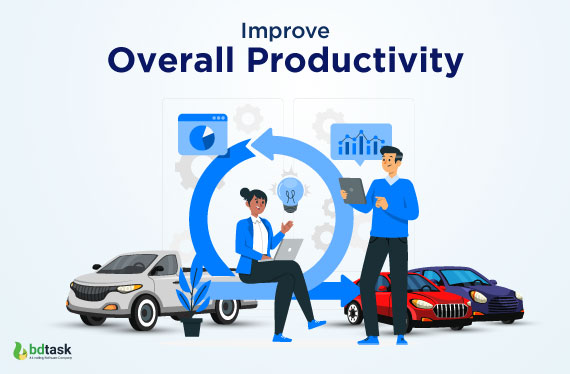
Fleet management solutions contribute to increased productivity by streamlining operations and eliminating inefficiencies. Automated processes, such as electronic documentation and digital workflows, reduce manual paperwork and administrative tasks.
With this fleet management, logistics allows companies to focus on core activities, allocate resources more effectively, and achieve higher productivity.
#Improve Driver Behavior #
Fleet management systems help monitor driver behaviour, encouraging safe and responsible driving practices. Features such as speed monitoring, harsh braking detection, and driver performance reports promote better driving habits, reducing accidents and associated costs. Companies can boost employee morale and foster a positive work environment by recognising and rewarding good driving behaviour.
#Effective Asset Management#
Logistics companies heavily rely on their fleet of vehicles as valuable assets. Fleet management systems facilitate effective asset management by providing comprehensive data on vehicle performance, maintenance schedules, and lifecycle management.
This data allows companies to make informed decisions about fleet expansion, retirement, and replacement, ensuring optimal asset utilisation and reducing unnecessary expenses.
#Better Resource Allocation#
Fleet management allows companies to allocate their resources more effectively. By analysing vehicle utilisation, route efficiency, and driver performance data, fleet managers can make informed decisions on fleet size, vehicle replacements, and driver assignments. It leads to optimised resource allocation and improved overall fleet performance.
Overall, merging with a software platform gives logistical managers more insight into their fleet's performance and helps them improve it faster than ever before.
#Environmental Sustainability#
In an era where environmental concerns are important, fleet management contributes to sustainability efforts. Logistics companies can minimise their carbon footprint by optimising routes and reducing fuel consumption.
Integrating electric vehicles and alternative fuels into fleet management systems promotes eco-friendly transportation practices, reducing emissions and supporting environmental conservation.
Fleet managers can track vehicle emissions and promote eco-friendly driving practices.
By adopting electric or hybrid vehicles and implementing sustainable transportation strategies, logistics companies can demonstrate their commitment to a greener future.
#Real-time Tracking and Asset Security#
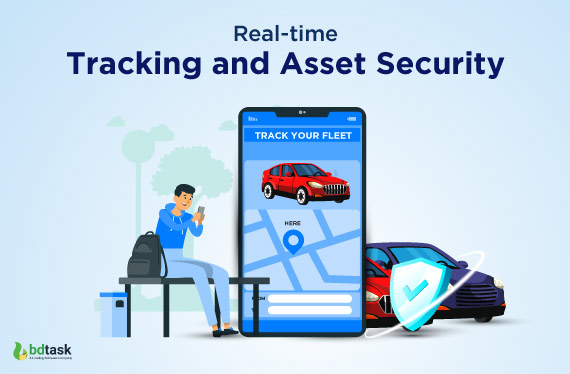
Effective fleet management solutions provide real-time tracking capabilities that enable logistics companies to monitor the location and status of their vehicles at all times.
This feature proves invaluable in case of theft or unauthorised use, as it allows for prompt response and recovery.
By integrating geolocation technology with telematics systems, businesses can enhance asset cloud based security, mitigate risks, and protect valuable cargo. Real-time tracking also facilitates accurate delivery ETAs, improving customer service and increasing customer satisfaction.
Best Practices for Effective Fleet Management
Regarding productive fleet management in logistics, best practices can make a real difference.
Here is the five-step to consider:
- Establish clear policies and procedures for fleet operations.
- Regularly monitor and analyse key performance indicators to identify areas for improvement.
- Invest in driver training programs to promote safe driving habits and fuel-efficient practices.
- Conduct regular vehicle inspections and maintenance.
- Embrace technology and leverage data analytics to optimise routes, monitor fuel consumption, and enhance decision-making.
Pick The Best FMS in Logistics
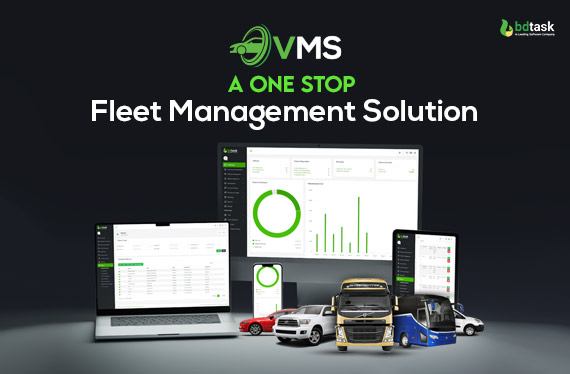
Many enterprises and organisations are ordering fleet management systems to increase business operations and cut extra operational costs.
Note that: Fleet management software varies between two types of management software.
- Out Of Box (Ready-made Software)
- Custom Software Development
VMS(Vehicle Management Software) offers the opportunity to have complete control of your software over a solution developed, create a personalised add fleet management software features and user interface and enhance functionality by adding any integrations.
Endnote
Fleet management is a vital component of the logistics industry, encompassing various tasks and strategies to optimise vehicle utilisation, reduce costs, and enhance operational efficiency.
Logistics companies can excel in fleet management and gain a competitive edge by implementing best practices, leveraging Software solutions, and prioritising driver safety. Understanding what fleet management in logistics is and how it helps an organisation to boost their revenue.
Understanding the intricacies of fleet management is essential for professionals as it contributes to the seamless flow of goods and services in today's interconnected world.
Fleet management software is the ultimate solution that helps business owners manage many vehicles seamlessly.










